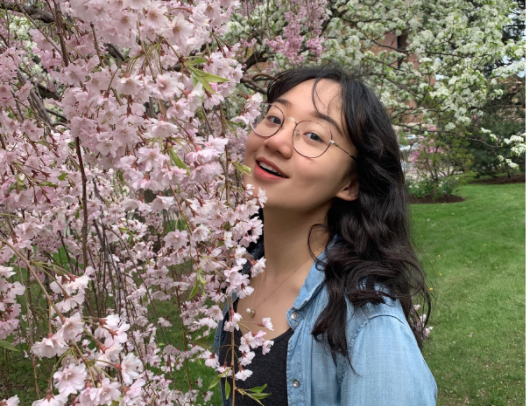Junior Panzhen Wu has combined creativity and calculations to undertake an interdisciplinary exploration of music, mathematics, science, and technology.
Wu, a Mathematics and Music double major with a minor in Philosophy, is currently researching the intersection between music and assorted fields, such as music technology and music cognition. In the past year, Wu has worked on a data science project with three other students, determined to find the correlation between a tonal language and sung melodies.
In English, various consonants and vowels make up different words, and saying the same sounds in a different tone might change the meaning, but the word stays the same. In a tonal language, different tones or pitches represent entirely different words. The tonal language used for the project was Cantonese, and the Cantonese songs selected were sung by Chinese singer Eason Chan.
The result showed a high correlation between the tone contour of the lyrics and the melodic contour. “Next semester, we will pick up the project and extend it,” Wu said. “The possible direction would be to build up a model for melody generation using machine learning, based on the tone contour of given lyrics.”
Wu continues to broaden her research experience by venturing into fields that may not directly relate to her mathematics and music degrees.
Last semester, Wu joined Professor Elise Piazza’s Lab in the Brain and Cognitive Sciences Department, where she focused on music cognition and communication in human interaction. Wu’s current project involves organizing and analyzing MIDI data from piano performance. “We wish to see the impact of shuffling measures (a rearrangement, in multiple degrees, of musical phrases of one piece) on the prediction and accuracy of a piano player’s real-time performance.”
The project is a part of an ongoing research conducted by Piazza using naturalistic paradigms to study music performance and learning within the department.
Despite the COVID-19 pandemic and two online semesters, Wu was able to continue her research remotely. “Since the raw data of the [BCS, Piazza Lab] project I am working on has already been collected before the COVID[-19] lockdown, my research process is not interrupted by COVID[-19],” Wu said. “We proceed with the project on the computer. However, the virtual reality of the semester is usually hard for us to keep up the motivation.”
After several research projects, Wu has plenty of wisdom to share. She suggests that students do a literature review before beginning their research. This will allow them to gain a more comprehensive understanding of research works and learn the importance of acknowledging the contributions of other individuals. “So far, I think the most valuable thing for me is not about getting a valid result of the research project, but about what I have learned from the research experience,” Wu mentioned. “But I always remain humble. I stay curious, keep learning, while expecting ‘aha’ moments.”
Wu encourages undergrads to follow their interests and to not hesitate to reach out to professors for research opportunities.
“Along the way, you might be able to figure out which kind of […] research is your favorite, research/question-oriented or project-oriented. Stay curious and be open-minded for any possibility,” Wu added. “Even if you are not confident in the research field that you are interested in.”
Wu is exploring and deciding on various post-graduate pathways. She plans to apply for Take 5 first, with a potential topic in Empirical Aesthetics.
Additionally, Wu plans on exploring research in the humanities with an emphasis on digital humanity or musicology. “Or I might also want to continue doing research and projects related to science of music and music technology, or pursue an industrial job in music composition, or, or do something interdisciplinary,” Wu explained. “Just don’t be afraid to reach out to people even though you are not majoring directly in that field.”

